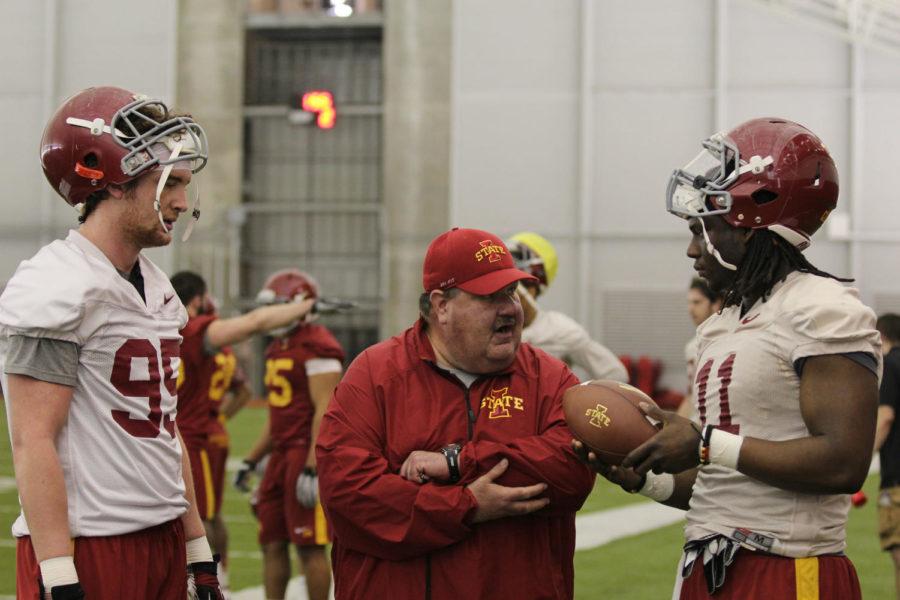The mind of Mark Mangino
Miranda Cantrell/Iowa State Daily
New Cyclone offensive coordinator Mark Mangino coaches players during the Cyclones spring football practice at the Bergstrom Football Complex on Monday, March 10.
August 28, 2014
At 13 years old, most pick-up baseball and football games are schoolyard events with more confusion than organization. Lineups are determined by captains, plays are made up in the huddle and rules are made up when problems arise.
At 13 years old, kids dream about playing in the NFL or NBA before even fully understanding the game. Kids don’t dream about coaching. They dream about becoming the next star.
But at 13 years old, Mark Mangino not only dreamt about coaching — he was coaching.
“I was player/manager for the city playground softball team when I was about 13 [years old],” Mangino said of growing up in New Castle, Pa. “It was nothing real organized, but I realized I kind of liked being the guy that was calling the shots and making the lineup and making decisions.”
Mangino was the one who gathered up a group of neighborhood kids and went to play in city tournaments against other neighborhood teams.
While most kids were memorizing their favorite players’ stats, Mangino took notes on major league baseball managers. He studied why managers put pinch hitters in at certain times and why teams would play defense against certain hitters.
By the age of 15, Mangino had led his neighborhood softball team to three city softball championships as a player/manager. Before graduating high school, Mangino developed a love for coaching that would stick with him through college.
Building a Legacy
Out of high school, Mangino was offered a scholarship to play football for Youngstown State University, just 18 miles across the border in Ohio. The school ended up becoming more than just his alma mater. It became his home.
He played semi-professional baseball in the area before becoming an EMT and patrolling his stomping grounds. In his late 20s, he went back to Youngstown State to earn his degree and become assistant coach for the football team.
It was there that he started his journey of learning from some of the best mentors and coaches in college football, coaching under Jim Tressel in his two seasons at Youngstown State.
“I tried to listen to the coaches that were smarter than me,” Mangino said. “I paid attention, took notes and tried to be a student of the game when I was a young coach. My parents told me when I was young I could learn more by listening than talking.”
His journey took him from high school-level jobs to an eight-year stint as an assistant football coach at Kansas State under Bill Snyder. He coached under Bob Stoops and worked with countless other successful college football coaches. By the time he left Kansas, he was the first ever coach to win national assistant coach of the year and national coach of the year awards.
When ISU head coach Paul Rhoads announced the hiring of Mangino last winter, the list of accomplishments and accolades were well known throughout the country. Mangino offers more coaching experience with a more diverse coaching background than most college football coaches in the country.
“He brings 19 years of Big 8 [and] Big 12 experience,” Rhoads said. “This is a guy who has been a part of turnarounds at Kansas State, a guy who was the play-caller for a national championship team at Oklahoma and took Kansas to unprecedented heights as head coach and very much involved with the offense at that program. He knows how to run it, he knows how to pass it. He knows how to take advantage of the personnel that he has in place.”
Method to the Madness
So, what makes a great coach? How does one go from winning city softball tournaments to national championships? For Mangino, years of experience and a plethora of proven mentors contribute to the cause.
But behind all the schemes, practice methods and coach-speak, he says successful coaches share something much less complicated.
“I don’t want to simplify this, but it is being pragmatic — being a practical thinker,” Mangino said. “Don’t try to get a square peg in a round hole. Don’t worry about what your signature plays are, just worry about the plays that your players can make.”
It is a philosophy that has led to the success of not only the teams he has coached but the individuals as well. He coached two Heisman Trophy runner-ups, a Heisman winner, and an Outland Trophy winner.
It is the philosophy that he lives his life by: Be able to adapt. From neighborhood baseball manager to EMT to national coach of the year, Mangino spent his life adapting. His goal at Iowa State is to make the most of what he has instead of what he doesn’t have.
However, the most influential mentor in Mangino’s life was not an award-winning coach. It was the man who sat next to him on the couch as they watched baseball and football games, young Mark Mangino taking notes on managers’ every move.
“My father was a really big influence on me, he was a guy that was really cerebral,” Mangino said. “When we watched the game as fans, we sat at home and he thought he knew what was best. He passed away a long time ago, but I’m sure he’d critique my work on a daily basis.”







